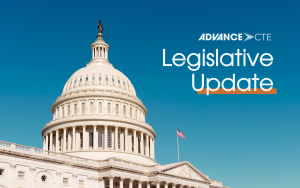This week, the House Appropriations Subcommittee for Labor, Health & Human Services, Education and Related Agencies advanced a fiscal year 2026 proposal. Negotiated rulemaking for several postsecondary policies included in the summer’s reconciliation bill has begun. Additionally, the White House hosts an event on artificial intelligence, the Secretary of Labor continues a national tour, and the U.S. Department of Education issues further information on Public Service Loan Forgiveness and language materials for learners and parents.
House FY26 Labor-HHS-ED Appropriations Bill Introduced
On Tuesday, the House Appropriations Subcommittee on Labor, Health and Human Services, Education and Related Agencies (Labor-HHS-ED) approved its fiscal year (FY) 2026 appropriations bill. The proposal includes $12.1 billion in cuts to the U.S. Department of Education (ED), roughly 15% of the current ED budget, and $4 billion in cuts to the U.S. Department of Labor (DOL), approximately 30% of the current DOL budget. The legislation includes significant proposed reductions in Title I of the Every Student Succeeds Act (ESSA) and formula grants available through the Workforce Innovation and Opportunity Act (WIOA), as well as a proposed elimination of Adult Basic Education (ABE) and several other programs.
In addition, the House Labor-HHS-ED bill proposes to increase funding for the Carl D. Perkins Career and Technical Education Act’s (Perkins V) State Grant program by $25 million, which would bring the total investment in state Career Technical Education (CTE) systems to $1.456 billion, with $10 million proposed for CTE national activities. Advance CTE continues to advocate for strengthened investment in CTE through Perkins V’s State Grant alongside other key funding streams that support the wider education and workforce development state systems. Fact sheets regarding the House proposal have been made available by Republicans and Democrats.
As previously reported, the Senate Appropriations Committee approved its version of the Labor-HHS-ED funding bill at the end of July. In contrast to this week’s House bill, the Senate bill provides level funding across most programs, including Perkins V’s State Grant program, which remains unchanged from FY25 levels.
Lawmakers will need to reconcile the differences between these two bills before September 30, the end of the fiscal year, and are rumored to do so in the form of another continuing resolution. Click here to view the current status of the wider FY26 appropriations process. Advance CTE will continue to report on the appropriations process and engage with partners on Capitol Hill to advocate for CTE and broader federal investment priorities.
ACTION NEEDED: CLICK HERE TO CONTACT YOUR CONGRESSIONAL REPRESENTATIVES to advocate for investment in education and workforce development in FY26!
Comment Period Closes Ahead of Postsecondary Rulemaking Process
In July, ED moved to establish two Negotiated Rulemaking Committees that will work to craft new rules for many of the postsecondary policies included in Congressional Republicans’ and the Trump Administration’s reconciliation bill, known as the One Big Beautiful Bill Act (OBBBA). As part of this process, negotiators will be tasked with determining the rules that will govern the implementation of the newly created Workforce Pell Grant program. As part of this process, Advance CTE and the Association for Career and Technical Education (ACTE) submitted joint comments to inform the development of these forthcoming regulations.
The comments emphasize the importance of including representatives from community and technical colleges, as well as area technical centers, on the Accountability in Higher Education and Access through Demand-Driven Workforce Pell (AHEAD) Committee. The comments noted the opportunity to build Workforce Pell systems on existing state frameworks under Perkins V and WIOA, which already identify high-skill, high-wage, in-demand sectors and credentials of value, and are flexibly built to align with local labor market needs. The comments also highlight the critical need to support states in expanding critical data infrastructure to ensure the new program is successful and implemented with fidelity. Advance CTE looks forward to engaging with this process as it continues to take shape later this year.
Questions Remain Regarding New PRWORA Interpretation
This summer, ED issued new guidance related to Personal Responsibility and Work Opportunity Reconciliation Act (PRWORA) that implicates postsecondary CTE programs and dual and concurrent enrollment initiatives funded by Perkins V, as well as adult basic education programs funded through WIOA. As previously shared, the new legal interpretation seeks to place new limits on the ability of undocumented learners to access or benefit from these federal investments. These changes have prompted significant questions about how states, postsecondary institutions, and local grantees should implement the new requirements. As part of an ongoing lawsuit involving nearly half of all states, the administration recently agreed to a stay in enforcing the new guidance until September 10, a deadline that may be extended depending on the outcome of the court case.
To support the field in navigating this complex regulatory environment, Advance CTE, ACTE, the American Association of Community Colleges (AACC), and the Association of Community College Trustees (ACCT) sent a letter to ED Secretary Linda McMahon requesting clarification on a wide range of issues raised by states, CTE practitioners, and postsecondary institutions. However, ED’s response to these questions remains forthcoming.
White House Holds AI Event
Yesterday, the White House convened an event focused on the artificial intelligence (AI) task force, with cabinet members and the First Lady delivering remarks about building an AI-ready workforce through engaging parents, educators, and learners. U.S. Department of Agriculture (USDA) Secretary Brooke Rawlins announced USDA partnerships to expand AI education and apprenticeships through 4-H, Future Farmers of America (FFA), and land-grant universities. ED Secretary McMahon re-emphasized that AI is going to be a priority in federal grantmaking, and DOL Secretary Lori Chavez-DeRemer highlighted that DOL has recently issued new guidance on how to use WIOA funds to support AI training and related skill development.
These efforts are all part of a wider response to an executive order (EO) titled “Advancing Artificial Intelligence Education for American Youth” issued earlier this year that focused on AI literacy, skills training, and educator development in K-12 systems. This order created a task force that led this week’s event at the White House and will continue to spearhead the Administration’s wider efforts on this topic.
In addition, this year’s CTE Momentum Challenge is geared towards helping learners envision AI-driven careers. ED is also inviting high schools to propose AI solutions that reimagine work through the AI Horizons Challenge that launched this August.
Odds & Ends
- Recently, ED took an additional procedural step to implement data collection instruments for Perkins V, known as an Information Collection Request. The move is part of ED’s broader effort to maintain current data and reporting requirements that have been in place for the legislation for the last several years – an effort Advance CTE and partners have continued to support at this late stage in the law’s implementation.
- ED proposed new Public Service Loan Forgiveness rules to bar employers engaged in illegal or harmful activities from program eligibility in response to the Trump administration’s executive order titled “Restoring Public Service Loan Forgiveness.” Public comments are open until September 17, 2025.
- DOL Secretary Chavez-DeRemer crossed the halfway point of her 50-state tour to highlight job growth and workforce training across the nation. Click here to read more about the Secretary’s recent visits.
- The Trump administration rescinded a 2015 Dear Colleague Letter issued initially by ED and the U.S. Department of Justice that issued guidance to state education agencies to provide language assistance for learners and parents, as well as duties in identifying English Learners (ELs). Click here to view the rescinded letter.


